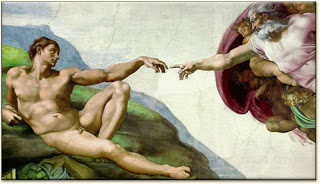Many people associate Christianity with Puritanism. If you are Christian then nudity and sex must make you uncomfortable.
Not so.
Christians believe God loves the human body – so much so that He created our bodies and took one upon Himself!
The association of the soul with what is good in the human person and the body with what is bad is a common error in thinking that reared its ugly head in the late first century and is still present today. This line of thought is called Gnosticism, a heresy that was condemned by the Church long ago, but it makes its way into our thinking nevertheless.
Blessed James Alberione (the founder of the Pauline families) understood that our bodies are good, even sacred, and he emphasized care for both the body and the soul in his writings. Although this is fully in keeping with Catholic theology, in some ways he was ahead of his time in viewing the body as a beautiful gift that we need to take care of, not just dominate.
The Church teaches that all human beings are composed of an intimately unified body and soul. Philosopher Peter Kreeft refers to the human person as “embodied souls” – the soul being so unified to the body that he says it is not even proper to speak of our body and soul as if they are parts of a whole.
When God created man, (soul and body), He saw that it was good – it was all good (Gn 1:31). It is through the Fall that both the body and the faculties of the soul were polluted by original sin.
But God did not give up on us.
God redeemed humanity, including our human bodies, by taking a body Himself. If we really take the time to think about this, it really is astounding. God, the Creator of the Universe became human. It would be like one of us choosing to become a worm. Muslims are shocked and offended at the very thought that God would choose to become one of us. We should understand to some extent their shock at this proposition – it is truly shocking! Shocking love.
God, through His Incarnation, lifts our soul and body through what Alberione calls the “third element” of our being that is available to us, if we accept it – Grace. Grace from God is what helps to harmonize the war between our fallen nature and God’s will for our body and soul. It is what gives us the strength to follow the promptings of God, even if we are screaming, “NO!”
Adam and Eve were overflowing with sanctifying grace in the Garden of Eden. It was easy for them to choose virtue, and yet they chose evil. Now, we have lost this gift of overflowing sanctifying grace from God and we are wounded, unable to make good choices easily. But through His Incarnation and the grace that flows from Jesus’ suffering and death, God provides us with opportunities to receive His grace back.
Through the sacraments, God gives us His sanctifying grace, the water for which our body and soul thirst. The sacraments are made for us, body and soul, which is why they always have form and matter. The matter of the sacraments – the water, bread, wine, oil, etc – are all for our body. The sacraments are visible and tangible because that is what our bodies need. They are made to feed us, to strengthen us, to heal us and to lift us to our original nature and even beyond that, to share in the divine life of the Trinity.
This does not mean that we cannot receive grace if we are not Christian. The Church believes that God can dispense His grace in whatever way He pleases, He is God after all! However, we know that grace is available to us in the sacraments. We do not know how God chooses to dispense grace otherwise. So this is why we should go to mass, (every day, if we are able!). God is waiting to pour His graces upon us.
Sacraments are proof that Christianity is a body-based religion – which is why as Christians we must love our bodies. We care for our bodies, not out of vanity but out of love for the body that is intimately connected to our soul. We must love our body so much that we hold it to be sacred, something to be cherished and loved. Carefully disciplining our fleshly desires is a form of love! But like a valuable jewel, we strive to not allow our bodies to be used or abused, even by ourselves.
When we care for our bodies, we care for our soul.
















